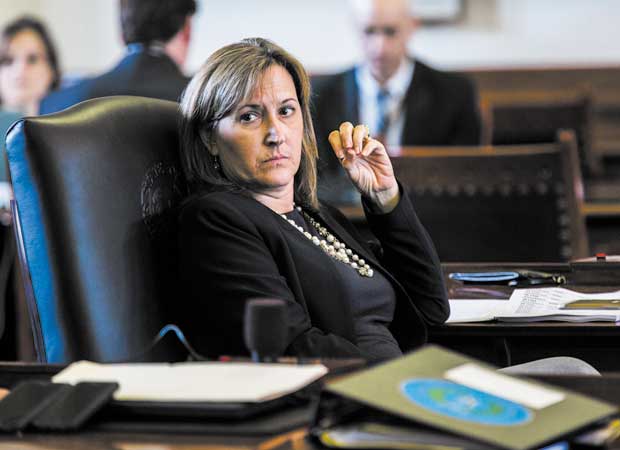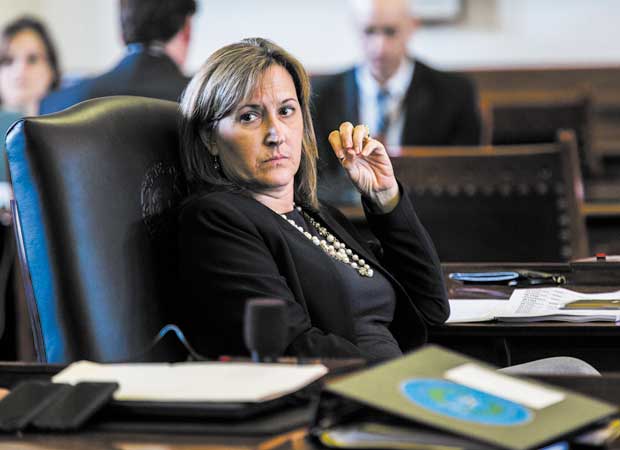LGBT advocates warn bill could force teachers, counselors to out students to their parents

Sen. Konni Burton, R-Colleyville, listens to discussions on open carry legislation during the final days of the 84th Texas legislature regular session in May 2015. As the Legislature gears up for its 85th session, opening in January, Burton has already pre-filed a bill that LGBT advocates say would force teachers and school counselors to out LGBT students to their parents. (Ashley Landis/The Dallas Morning News via AP)
Tammye Nash | Managing Editor
LGBT advocates and allies are warning that legislation pre-filed last week by state Sen. Konni Burton would require public school faculty and staff members to out LGBT students to their parents. But Burton condemned criticism of the bill, saying that it only strengthens existing state law.
SB 242 would, Burton wrote in a Nov. 16 post to her blog, “make it unequivocally clear that a parent has a right to full and total information on their child’s academic performance, physical, mental and emotional health, and more.
“Further,” she continued, “my legislation will make it expressly against state law for a district to adopt policies designed to undermine a parent’s right to know. No parent in Texas should ever have to fight for the basic right to matter in their child’s life again.”
In a follow-up post, dated Nov. 21, Burton decries the “misinformation being spread” about the proposed bill, saying that it only strengthens existing law, which already guarantees parents full access to school records and provides for disciplinary action against teachers and administrators that try to restrict such access.
But LGBT advocates say Burton’s bill takes the parental right to access a step too far, potentially forcing teachers and counselors to violate the trust of students who talk to teachers or counselors, especially about issues of sexual orientation and gender identity, because they are afraid to talk about those things to their parents.
“We are not interested in denying parents access to their children’s school records,” said Chuck Smith, CEO of Equality Texas, which opposes SB 242. “But in effect, if students know that their teacher or counselor could be forced to tell their parents anything the student tells them, that in effect destroys any relationship of trust or expectation of confidentiality they might have had with the teacher or counselor.”
Smith said that while current law does, indeed, guarantee parents have access to their children’s school records, Burton’s bill would add “any general knowledge about that student” that a faculty or staff member might have to the list of information that must be disclosed.
Smith noted that Burton’s bill defines “general knowledge” as “personal, direct or incidental knowledge.” He also points out that the bill states that even a child’s direct request that a school district employee keep certain information confidential “is not a defense to any disciplinary action taken against the employee.”
In defending the proposed legislation, Burton stressed that it does not require faculty or staff to immediately turn around and tell parents anything and everything they know about their children. But, Smith said, “If a parent says tell me everything you know about my child, then everyone who knows something would be compelled to tell what they know or face discipline.”
And while Burton also said in her blog post, “You will not find the words ‘sexuality’ or ‘gender’ anywhere in the proposed bill,” she did acknowledge that her bill would add information about “the child’s general well-being and health, both physical and mental” to existing state law.
And that is where, Smith said, Burton’s bill would in effect force school faculty and staff to out a student to the parents, if the faculty or staff member had “any general knowledge” that the student might be LGBT or even questioning his or her orientation or gender identity.
Burton is “accusing everyone of spreading misinformation about her bill. And she says everyone should read it. But if you read it, it does say that if a parent asks for that information, the teacher or counselor has to disclose it.”
Smith acknowledged that, as Burton has noted, her bill includes an exemption to the requirement to disclose information in cases where child abuse is suspected or confirmed. But, Smith added, there is a “catch 22” to the exception in cases where a child’s sexual orientation or gender identity is involved. Would a teacher or counselor be able to refuse to divulge that information to a parent if they feared doing so would put the child at risk, he questioned.
Smith also questioned Burton’s insistence that her bill is not intended to force school faculty and staff to out LGBT students to their parents when the senator herself said she introduced the measure in response to Fort Worth ISD’s implementation of policies last year on how the district would interact with transgender students.
The rules on implementing policies adopted several years earlier, in part, allowed faculty and staff members to keep information regarding a student’s gender identity confidential, even from parents, if the student asked them to. The rules also addressed the use of public restroom facilities by transgender students.
When the implementation was announced, Lt. Gov. Dan Patrick traveled to Fort Worth to hold a press conference to denounce the policy, which opponents claimed was implemented by Supt. Kent Scribner without input from the public or a vote by the Board of Trustees. School officials noted that the rules in question were actually just the superintendent’s guidance on implementing policies previously adopted by the board.
FWISD officials did eventually revise the rules to address concerns about parents’ right to access information about their children.
Sen. Burton did not reply to a Dallas Voice email asking for comment for this story.
……………………
Read the bill
Texas state Sen. Konni Burton — accusing LGBT advocates of spreading misinformation regarding legislation she has filed to amend state law regarding parents’ access to information school officials have about their children — urged people to read the text of the bill she pre-filed last week.
Burton’s Senate Bill 242 would amend Section 26.004 of the Texas Education Code. Section 26.004 currently declares that, “A parent is entitled to access to all written records of a school district concerning the parent’s child, including: (1) attendance records; (2) test scores; (3) grades; (4) disciplinary records; (5) counseling records; (6) psychological records; (7) applications for admission; (8) health and immunization information; (9) teacher and school counselor evaluations; and (10) reports of behavioral patterns.”
Burton’s bill would add: “and other records relating to the child’s general physical, psychological or emotional well-being; and except as provided by Section 38.004 [which allows for exceptions in the case of suspected or confirmed child abuse] information regarding the school activities of the parent’s child and disclosure of any general knowledge regarding the parent’s child possessed by an employee of a school district, including general knowledge that relates to any of the categories of information” addressed in the statute as it stands.
Burton’s bill continues:
“An attempt by an employee of a school district to conceal or withhold, or to encourage or coerce a child to withhold, information or general knowledge concerning the child from the child’s parents is grounds for discipline [under other applicable sections of the Education Code, which all faculty and staff to be fired or suspended].”
“A request by a child to an employee of a school district to conceal or withhold information or general knowledge concerning the child from the child’s parent is not a defense to any disciplinary action taken against the employee.”
“A school district may not adopt or enforce any rule that conflicts with this section.”
“For purposes of this section, ‘general knowledge’ means personal, direct or incidental knowledge.”
This article appeared in the Dallas Voice print edition November 25, 2016.

